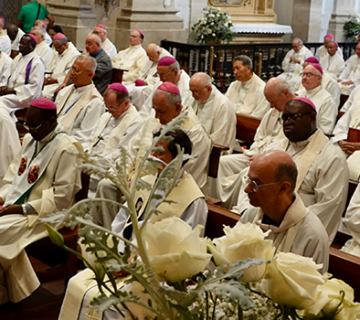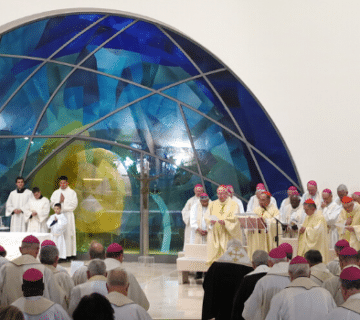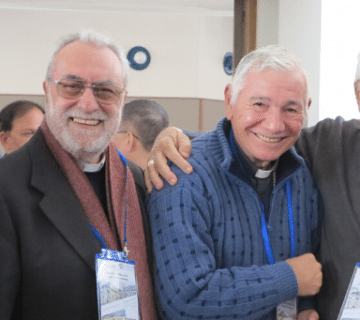Surprise and trepidation was the reaction of the Bishops, friends of the Focolare Movement, at the news of the Pope’s additional confinement in the hospital. They received the news just before the conclusion of their meeting held from Feb. 19-25, 2005 at the Mariapolis Center of Castelgandolfo (Rome).
Before leaving for their respective dioceses, they sent the Pope this message: “Dearest Holy Father, before leaving Castelgandolfo, we are sending you our warmest greetings together with our heartfelt wishes for your prompt recovery. United with the whole Church in unceasing prayer, together with Mary Most Holy, we ask for extraordinary graces and comfort from the Holy Spirit, the Consoler, for you. Thank you, Holy Father, for your luminous example of faith and love in facing this new trial. Thank you for your ministry which is wholly a gift!”
Indeed, the outstanding characteristic of those days was the exchange of messages with the Pope. A letter from the Pope to Cardinal Miloslav Vlk, promoter of the meeting – a completely unexpected gift during these days of the Pope’s infirmity – gave a powerful and incisive tone to the days together. In reply, the bishops wrote: “Holy Father, truly you are the one who ‘loves most’ and ‘confirms his brothers’.”
John Paul II in his message made special mention of Chiara Lubich, expressing his “gratitude for the evangelical witness which the Movement gives in many parts of the world.” With reference to the theme of the meeting – “The presence of the Risen Jesus in the midst of his people: a vital principle for the Church of the 3rd millenium” – the Pope encouraged the bishops “to give witness in today’s society to the presence of the Risen Christ, the center of the Church.” He also said that a “renewed apostolic vitality and missionary audacity,” responsive to the challenges of our times cannot but spring forth from a gathering based on this “vital principle.” He therefore invited the participants to be “eloquent signs” of the love of the crucified and risen Lord, present in the Eucharist, and “artifices of his peace everywhere.”
The presentations offered throughout those days marked by the warmth of brotherhood among all, reiterated the Pope’s appeal, as they presented the numerous sufferings of humanity: wars, hunger, sickness, precarious political and economic situations. At the same time, they transmitted an even greater faith in God’s intervention, inspiring firm and enlightened action. For example, Bishop Simon Ntamwana of Burundi spoke of the efforts done by his country’s episcopate to create a culture of peace and reconciliation after these difficult recent years. A bishop from Central America related how, strengthened by the experience he had made in last year’s meeting, to his surprise, he was able to act as a peacemaker among politicians. Bishop Desiderius Rwoma of Tanzania spoke of the spreading of the spreading of the Gospel as a result of constituting small spiritually formed Christian communities which are now attracting even a large number of non-Christians.
Chiara Lubich, in her message read by Natalia Dallapiccola, one of her first companions, dealt in depth on Jesus’ promise to be present there “where two or more are united” in his name (see Mt 18,20). She underlined that “The Risen Jesus is not a static presence; rather he is a ‘unifying principle,’ and is therefore active: love.” She went on to say, “This, however, requires the response of the human being.” “Every division in the community, therefore, is against nature,” rather, “it creates an alteration in the profound identity of the community, which is Christ present there… This is why, at times, the Church is not loved.” It is, therefore, necessary to lead the believers’ interrelationships ever more closely towards “reciprocity, towards communion, which renders the Lord ‘visible’.”
Conscious of the current world situation, the bishops manifested a deep sensitivity to these concepts, which were elaborated on in the succeeding days through a series of cultural reflections. These were offered by philosopher, Giuseppe Maria Zanghì, who spoke on the turnabout of this epoch and on the developments of academic dialogue with the Hindus and the Buddhists; by Hubertus Blaumeiser and Brendan Leahy – two theologians – who dealt on how the comprehension of the presence of the Risen Jesus and giving him the central place can affect various aspects of the life of the Church; Brazilian sociologist, Vera Araujo, who spoke on the human person in the context of a global society.
These reflections were reinforced by the experiences shared by bishops, priests and lay people on the “renewed apostolic vitality” that comes from the presence of the Risen Jesus. The ecumenical aspect was presented through experiences on the dialogue of life, offered by bishops of different Churches. They also spoke of the growth in communion among movements and communities, made manifest in the great meeting at Stuttgart last May, entitled “Together for Europe”. Evangelical Pastor Friedrich Ashoff elaborated on this meeting.
The political dimension was illustrated by Lucia Crepaz, president of the “Political Movement for Unity”. Tracing the ten-year experience of this Movement, she explained the characteristics of a political action that aims at being service to society, whose method is dialogue, and is therefore able to create “a network made up of different elements.”
The planned “Familyfest” of April 16, 2005, announced by Annamaria and Danilo Zanzucchi, directors of the New Families Movement of the Focolare, drew the special interest of the bishops. At a time when the family as an institution is undergoing a serious crisis, the event hopes to put into light the family according to God’s plan in the context of today’s challenges. A large number of bishops expressed their desire to cooperate in making the Familyfest a reality in their respective countries. There are in fact 120 spots all over the world, which will be linked with Rome on live by television.
“Here I experienced the freshness of the Gospel,” remarked Bishop Jean Ntagwarara from Burundi, one of the 20 bishops from Africa present. Expressing the conviction shared by many of his co-bishops, he said: “The spirituality put into practice is the remedy that can heal the many wounds of our people.” Bishop Giovanni Dettori from Sardinia (Italy), had this to say: “Unity gives me strength: one can feel that we are all one heart and one soul.” The most frequent observation of the participants was, in fact, that of having experienced “the living Jesus” throughout the time together, Jesus who today continues to touch the hearts of people and to move minds and arms to act in accordance with his Gospel and to express the gift of his love among people.
In the context of this year dedicated to the Eucharist, particularly meaningful was the concelebration presided over by Bishops grouped according to different continents, who used elements typical of their respective cultures.


 Italiano
Italiano Español
Español Français
Français Português
Português


